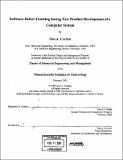| dc.contributor.advisor | Nancy Leveson. | en_US |
| dc.contributor.author | Curhan, Lisa A., 1961- | en_US |
| dc.contributor.other | System Design and Management Program. | en_US |
| dc.date.accessioned | 2006-11-08T16:44:46Z | |
| dc.date.available | 2006-11-08T16:44:46Z | |
| dc.date.copyright | 2005 | en_US |
| dc.date.issued | 2005 | en_US |
| dc.identifier.uri | http://hdl.handle.net/1721.1/34824 | |
| dc.description | Thesis (S.M.)--Massachusetts Institute of Technology, System Design & Management Program, 2005. | en_US |
| dc.description | Includes bibliographical references (p. 74-75). | en_US |
| dc.description.abstract | Software defects (colloquially known as "bugs") have a major impact on the market acceptance and profitability of computer systems. Sun Microsystems markets both hardware and software for a wide variety of customer needs. The integration of hardware and software is a key core capability for Sun. Minimizing the quantity and impact of software defects on this integration during new product development is essential to execution of a timely and high-quality product. To analyze the effect of software defects on the product development cycle for a midrange computer system, I have used a particular computer platform, the Productl server, as a case study. The objective of this work was to use Sun's extensive database of software defects as a source for data-mining in order to draw conclusions about the types of software defects that tend to occur during new product development and early production ramp. I also interviewed key players on the Productl development team for more insight into the causes and impacts of software defects for this platform. Some of the major themes that resulted from this study include: The impact of defects is not necessarily proportional to their quantity. Some types of defects have a much higher cost to fix due to customer impact, time needed to fix, or the wide distribution of the software in which they are embedded. Software Requirements need to be vetted extensively before production of new code. This is especially critical for platform-specific requirements. The confluence of new features, new software structure and new hardware can lead to a greater density of software defects. The higher number of defects associated with the new System Controller code supports this conclusion. Current Limitations of Defect Data Mining: Automated extraction | en_US |
| dc.description.abstract | (cont.) of information is most efficient when it can be applied to numbers and short text strings. However, the evaluation of software defects for root cause cannot be easily summarized in a few words or numbers. Therefore, an intelligent classification methodology for root causes of software defects, to be included in Sun's defect database, would be extremely useful to increase the utility of the database for institutional learning. Software Defect Data Mining seems to be underutilized at Sun. I have barely touched the surface of the information that can be extracted from our "BugDB" defect database. This data resource is rich with history. We should extract and analyze this type of data frequently. | en_US |
| dc.description.statementofresponsibility | by Lisa A. Curhan. | en_US |
| dc.format.extent | 75 p. | en_US |
| dc.format.extent | 6199802 bytes | |
| dc.format.extent | 6207472 bytes | |
| dc.format.mimetype | application/pdf | |
| dc.format.mimetype | application/pdf | |
| dc.language.iso | eng | en_US |
| dc.publisher | Massachusetts Institute of Technology | en_US |
| dc.rights | M.I.T. theses are protected by copyright. They may be viewed from this source for any purpose, but reproduction or distribution in any format is prohibited without written permission. See provided URL for inquiries about permission. | en_US |
| dc.rights.uri | http://dspace.mit.edu/handle/1721.1/7582 | |
| dc.subject | System Design and Management Program. | en_US |
| dc.title | Software defect tracking during new product development of a computer system | en_US |
| dc.type | Thesis | en_US |
| dc.description.degree | S.M. | en_US |
| dc.contributor.department | System Design and Management Program. | en_US |
| dc.identifier.oclc | 60503534 | en_US |
